Are you a Quiet Speculation member?
If not, now is a perfect time to join up! Our powerful tools, breaking-news analysis, and exclusive Discord channel will make sure you stay up to date and ahead of the curve.
Yesterday, Brian Braun-Duin published "When Playing to Win Is a Loss," an article detailing the dangers of getting caught up in the competitive spirit. It admonishes angle shooting and makes a case for sportsmanship in a gaming environment. Brian's thoughts resonated with some of my own, especially as relates to the place of ethics in Magic and the virtues of refining one's own tastes. Today's article responds to some of the points he made, examining the balance between ethics and ruling ambiguities and stressing the worth of self-knowledge.

Know Theyself: Saga of the Scrub
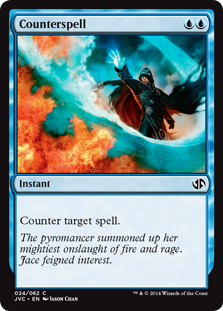 BBD's article draws heavily on an e-book called "Playing to Win" by David Sirlin. PTW defines a scrub as any player imposing artificial restrictions on themselves when it comes to playing a game, be it for reasons of principles, preference, or something else—for instance, staunchly refusing to play Counterspells or Red Deck Wins, even if those be the dominant strategies in a given format. BBD goes on to reveal the inner peace he's achieved by accepting that playing to win, in the hardcore, Sirlin sense, is not for him after all.
BBD's article draws heavily on an e-book called "Playing to Win" by David Sirlin. PTW defines a scrub as any player imposing artificial restrictions on themselves when it comes to playing a game, be it for reasons of principles, preference, or something else—for instance, staunchly refusing to play Counterspells or Red Deck Wins, even if those be the dominant strategies in a given format. BBD goes on to reveal the inner peace he's achieved by accepting that playing to win, in the hardcore, Sirlin sense, is not for him after all.
I came to a similar realization myself two years ago, while half-heartedly preparing for an SCG Invitational. Since then, my Magic goals have become more defined; I've been able to pour my newfound knowledge of self towards ensuring the game better meets my needs, a feat that has kept me interested in and involved with Modern. Articles like "Love What You Play: Taking the Taste Test" suggest some benefits of understanding one's own preferences.
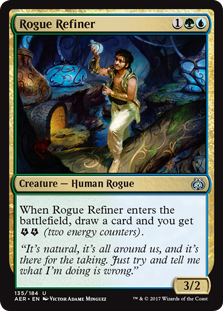 This idea of refining tastes is one we'll continue touching on throughout this article, as it pertains to every topic herein. As it relates to PTW, though, "knowing thyself" in this way—or, deliberately choosing the Path of the Scrub—may actually prove more competitively sound than Sirlin would have us think. Letting preferences get in the way of the "correct" choice, he argues, counteracts the goal of winning. But what if, without the ensuing enjoyment, playing the game at all became unsustainable? What if playing a worse deck for a given metagame keeps players stimulated enough that they stick around and amass the reps necessary to succeed in Modern? These exceptions to Sirlin's rule explain what BBD means by the title of his article; fun is in fact paramount to competitive success so long as it incentivizes players to continue playing.
This idea of refining tastes is one we'll continue touching on throughout this article, as it pertains to every topic herein. As it relates to PTW, though, "knowing thyself" in this way—or, deliberately choosing the Path of the Scrub—may actually prove more competitively sound than Sirlin would have us think. Letting preferences get in the way of the "correct" choice, he argues, counteracts the goal of winning. But what if, without the ensuing enjoyment, playing the game at all became unsustainable? What if playing a worse deck for a given metagame keeps players stimulated enough that they stick around and amass the reps necessary to succeed in Modern? These exceptions to Sirlin's rule explain what BBD means by the title of his article; fun is in fact paramount to competitive success so long as it incentivizes players to continue playing.
The Ethics of Magic
Soon enough, BBD dives into the murky waters of ethics:
[Sirlin is] clear that if there is something within the rules that you are allowed to do, you should do it, even if it seems exploitative. That's where I draw the line in the context of Magic.
In this passage, the author begins his steady trek up the high road of sportsmanship. It's a path I've walked myself, and have come to grow disillusioned with. Just as fun is subjective, so too are terms like "exploitative." For instance, to Sirlin's "scrub," playing Counterspell is exploitative. Since different players enjoy different elements of the game and expect different things, sportsmanship is far from definite or universal. All that's universal in any game is the rulebook.
Oops-I-Moralist
BBD claims that he doesn't want to moralize, stating, “This [article] is about how I now choose to approach Magic and less about a moralization of what one should or shouldn't do,” but what else can we call an attempt to universalize terms as vague as "unsavory" and "downright miserable?" By whose standard do such terms apply? How is "angle shooting" even measured? "Cheating" has a clear meaning in the rules, but "angle shooting" does not. Decrying actions so undefined has little objective effect but to endorse a value system.
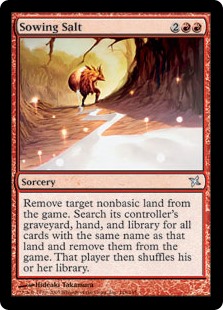 A younger version of myself also oops-I-moralized. In "Sowing Salt: Eliminating Toxic Attitudes," a piece published close to half a decade ago, I defined toxic as the antonym of productive. The article urged fellow players to consciously work towards creating a Magic community devoid of toxicity. Today, I would be much more hesitant to push that morality on anyone, much less my own readership, no matter how much I anticipate they may agree with me. And anticipate a positive response, I did; looking back critically, "Sowing Salt" was, to some degree, a plea for validation (which I indeed received from a community preoccupied with certain notions of good and bad). Perhaps any such moralization is. After all, I only even stumbled upon the BBD article because peers in my online networks were spreading it around.
A younger version of myself also oops-I-moralized. In "Sowing Salt: Eliminating Toxic Attitudes," a piece published close to half a decade ago, I defined toxic as the antonym of productive. The article urged fellow players to consciously work towards creating a Magic community devoid of toxicity. Today, I would be much more hesitant to push that morality on anyone, much less my own readership, no matter how much I anticipate they may agree with me. And anticipate a positive response, I did; looking back critically, "Sowing Salt" was, to some degree, a plea for validation (which I indeed received from a community preoccupied with certain notions of good and bad). Perhaps any such moralization is. After all, I only even stumbled upon the BBD article because peers in my online networks were spreading it around.
Mystifying though human motivations may be, they aren't the point of this article. Rather, my thesis re: ethics is that I've come to believe they have little to no place in a competitive game. In Magic specifically, ethics are often a mechanism invoked by players as a means for seeking validation (touched on above) and by, or in the name of, game ambassadors to defend needlessly ambiguous rulings (keep reading).
Solving for Ambiguity
Here's where BBD and I clash more explicitly. He writes:
The rules are often ambiguous and whether or not something is allowed or not allowed in the rules comes down to subjective measurements like how long someone paused between saying words, or how they gestured at something or what word choice they had when talking to their opponent. Those kinds of things aren't easy to make rules about, and the rules aren't always clearly defined or definitively black and white about whether something is or isn't allowed.
This isn't the fault of judges or the rules committee that develops the Magic Tournament Rules. In fact, I am continually impressed at how great the rules are for handling nearly every situation imaginable and how knowledgeable a lot of the judges I interact with are about how to properly apply those rules.
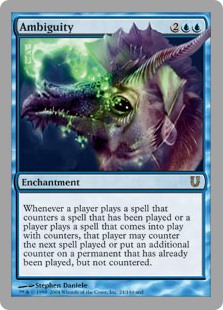 I, too, am impressed with and grateful for the work Wizards puts into making the game function smoothly. I feel that goes without saying; after all, I play Magic, and therefore consume Wizards’s product—my very participation in that cycle endorses the company’s efforts. I nonetheless disagree with some of their calls.
I, too, am impressed with and grateful for the work Wizards puts into making the game function smoothly. I feel that goes without saying; after all, I play Magic, and therefore consume Wizards’s product—my very participation in that cycle endorses the company’s efforts. I nonetheless disagree with some of their calls.
Specifically, I disagree entirely with BBD’s assertion that rules ambiguity is not the fault of the rules committee. In my eyes, that committee is entirely at fault for any ruling ambiguity. It is their literal job to address such ambiguity, which they in fact try to do in monthly digests.
Occasionally, though, the digests do the opposite. For a recent example, look to the Policy Changes for Ravnica Allegiance. This rules update changed the way triggers work:
Now, if you miss a trigger with a default option, your opponent decides if it goes on the stack. If it does, you make all the appropriate choices.
Under the old rules, if a player cast Summoner's Pact and drew their card for turn without paying 2GG, they lost the game. Under the new rules, if that player's opponent "catches" them missing their Pact trigger, the player must immediately pay 2GG, and may now do so with additional information at their disposal—they have drawn for turn. This rules change asks players to remember their opponent's triggers for them, and punishes players for their opponent's mistakes.
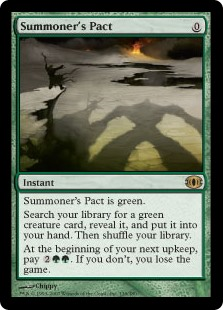 Of course, deliberately not paying for Pact with the intention of first seeing one's draw is cheating. But whether a player cheated or not is rendered ambiguous by this ruling, the decision in practice coming down not to what we know happened in-game, but to the capricious opinion of a judge. BBD argues that cases like these are inevitable in a game as dense as Magic, and there's nothing judges or the rules committee can do about their occurrence. He instead appeals to ethics, placing the onus on the player (in this case, himself), as I once did, to account for what I now see as needless ambiguities in the rules.
Of course, deliberately not paying for Pact with the intention of first seeing one's draw is cheating. But whether a player cheated or not is rendered ambiguous by this ruling, the decision in practice coming down not to what we know happened in-game, but to the capricious opinion of a judge. BBD argues that cases like these are inevitable in a game as dense as Magic, and there's nothing judges or the rules committee can do about their occurrence. He instead appeals to ethics, placing the onus on the player (in this case, himself), as I once did, to account for what I now see as needless ambiguities in the rules.
Needless how? Well, in Pact's case, the supplanted ruling was unambiguous: forgot to pay your Pact trigger? You lose. That ruling removes the possibility for exploitation from the equation altogether. In video games, for instance, such unambiguous rules enforcement is built-in, which in my eyes leads to a higher skill ceiling; players are forced to work within hard lines, rather than allowed to find ways around those lines, such as cheating. Of course, Magic changes faster than a video game. But even if new rules issues come up, which they inevitably will, they can be addressed on a case-by-case basis as they arise. I don't see how the triggers change and other ambiguous rulings can't be made black-and-white as they are in other games.
In the Name of Fun
I don't see how, but I do hear why; many changes to competitive rules that I disagree with are traced back to blurry notions of fun. It apparently "feels bad" to untap, draw, and realize that you have lost because you didn't pay for your Pact. I do not find this argument compelling, as fun is too subjective. For me personally, rulings like these make a Competitive tournament less fun.
Magic has a built-in solution to this problem. Don't want to lose to a forgotten Pact trigger? Well, you are not required to put Pact into your deck. Similarly, this scenario would never 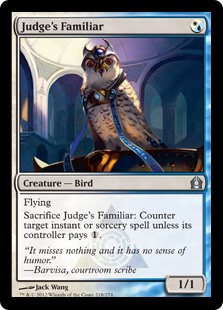 come up at lower levels of play anyway, because the rules are more relaxed at Regular REL; the "new rule" would have been applied there even before it was put into practice. Conversely, every Competitive REL tournament I've been to features a judge's opening monologue about how players will be held accountable for their mistakes at this level of play. Why suddenly baby players who knowingly and willfully enter into that contract, especially when such babying incentivizes cheating?
come up at lower levels of play anyway, because the rules are more relaxed at Regular REL; the "new rule" would have been applied there even before it was put into practice. Conversely, every Competitive REL tournament I've been to features a judge's opening monologue about how players will be held accountable for their mistakes at this level of play. Why suddenly baby players who knowingly and willfully enter into that contract, especially when such babying incentivizes cheating?
Fun, as mentioned, is subjective. I'd like to think that for most Magic players, the game itself is plenty fun at Competitive without added ambiguity. In fact, for certain players (myself included), the game is more fun when I and my opponents are held accountable for our mistakes. And to BBD, the game is more fun when players need not fret about the possibility of opponents exploiting ambiguous rulings:
I genuinely think the game is worse off if everyone is trying to “get” each other or exploit the rules to get edges over each other. Sirlin believes that people pushing games to their extremes makes those games better, and maybe in fighting games with programmed in rules engines, that is true, but I don't think it holds for Magic, which has a level of interpersonal interactions, relies on communication in tournaments as one of its core rule structures and has so many grey areas and ambiguities that the sheer amount of areas in which you can exploit things or abuse rules is astronomical and frankly exhausting to keep up with. It also creates a downright miserable experience for opponents who have to play against someone who is doing this or trying to do this at every possible situation.
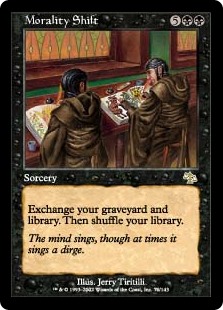 I'd argue that rules changes like the Pact one actually exacerbate this issue. I now have to worry about opponents exploiting a newly-ambiguous rule rather than knowing they will be held accountable for their mistakes. Ambiguous rules enable cheating. The more ambiguity we can eliminate in the rules, the less place ethics must hold in making Magic sustainable to play at high levels.
I'd argue that rules changes like the Pact one actually exacerbate this issue. I now have to worry about opponents exploiting a newly-ambiguous rule rather than knowing they will be held accountable for their mistakes. Ambiguous rules enable cheating. The more ambiguity we can eliminate in the rules, the less place ethics must hold in making Magic sustainable to play at high levels.
So, now what? The capitalist in me places the responsibility on the provider of the good, in this case Wizards—if they do enough things consumers do not like, consumers will stop buying. Power creep, dubious banlist management, and reprints (or a lack thereof) have all driven players I know away from Magic in recent years; while none of those elements bother me, the game's clinging to ambiguous rulings does.
Democracy of Enjoyment
Behind even diversity, Modern's calling card, Wizards has designated "fun" the number-one most important factor when it comes to nurturing the format. Of course, fun's subjectivity renders it impossible to define, so format analysts and banlist predictors tend to spend most of their energy on the next-best thing: gathering and assessing available data. That said, if enough players are vocal about things they do or don't find fun, and especially if that outcry corresponds with an indisputable effect of such distaste—for instance, 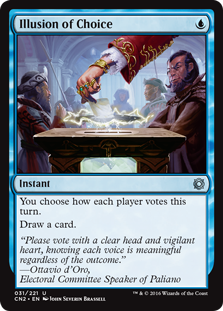 a marked drop in event attendance—Wizards is bound (inasmuch as "Where Modern Goes From Here" is binding) to take banlist action. In other words, banlist management, and what happens with Modern in general, is at least partially democratic.
a marked drop in event attendance—Wizards is bound (inasmuch as "Where Modern Goes From Here" is binding) to take banlist action. In other words, banlist management, and what happens with Modern in general, is at least partially democratic.
Every player gets a vote; to vote effectively, they must understand what they want out of a candidate. Players will have an easier time clearly articulating what is and isn't fun to them if they have a solid grasp on their own preferences. BBD digs into his personal taste in "When Playing to Win Is a Loss," determining the level of competitiveness he likes holding himself to. I did it myself in this article, expressing dissatisfaction with ambiguous rulings. Taste refining can also apply to other elements of Magic, such as deck selection and personalization.
In the words of Socrates, "to know thyself is the beginning of wisdom." Maybe it's also the beginning of something even more valuable: a better Magic experience.





I always get somewhat miffed when pro players who have been to the top of the proverbial mountain tell others who want to climb up to stop prioritizing it. That sentiment rings hollow in my ears, and my response is general cynicism in thinking that the inner circle of MtG pros and personalities just don’t want new faces around except for those anointed the next big thing by said inner circle.
I play this game because I have a competitive drive and a preference for puzzles and strategy over athleticism or brute force. I find winning fun. I like the grind. I don’t get mad when I lose to a random jank deck. I get annoyed with myself if I lose due to a mistake, but it doesn’t ruin my entire day. So yeah, I would prefer not to be told by pros, by brewers, or by casual players that my behavior is bad when I never insult, threaten, or condescend to my opponents over outcomes.
Oh, and yes the pact rule change is nonsense. If you don’t want to lose to a card in your own deck that literally says “if….you lose the game,” then, in the words of Dark Souls fandom, git gud.
That’s just life with moralizations though: somebody is always excluded. Exclusion may even be the point of moralizing at all, to some degree.
As far as the “stop prioritizing it” comment, as a self designated scrub, I feel like the pros are trying to say if you force yourself to take every angle and always make the ‘right’ choice instead of the fun choice and enjoying yourself, being at the “top of the proverbial mountain” won’t be as satisfying or enjoyable as you imagine it to be. I’ve found that to be true in other facets of my life.